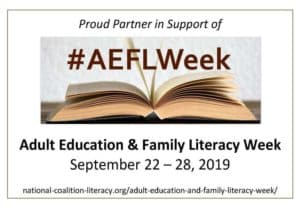Stand Up and Be Counted!
September 25th, 2019 | Blogs
With a presidential election and the decennial census coinciding, 2020 is a big year for adult education students and programs. Each of these major civic events will determine a great deal about the future. For example, the census will determine how more than $800 billion in federal aid is distributed to states for housing, education, and other services. Adult educators should note that WIOA funds are determined by a formula based on the census. The census also determines how district lines are drawn and how many House members each state gets. And of course during the election, we choose who will make new laws and represent our interests and the interests of our family and community in local and national government.
That’s why the New England Literacy Resource Center (NELRC) at World Education is working in collaboration with National Coalition for Literacy (NCL) to encourage adult education programs to integrate stronger-than-usual attention to civics in the coming year. As adult educators, we need to support our learners to “stand up and be counted.”
Census also provides job opportunities at good wages for qualified adults. The Census Bureau is hiring thousands of Census Takers, and they are particularly interested in bilingual applicants. Consider holding an information session about jobs available at your program. To learn more, go to 2020census.gov/jobs.
Once the census is in full swing, open up your computer lab to the community, so people can come in and fill out the online census form with your support. (You can’t fill if for them though.) Teach digital literacy skills associated with filling out the census form online. Partner with libraries, community organizations, and Complete Count Committees to spread the word about the census and why it matters.
In the lead-up to the elections, draw from the many teaching ideas we have gathered on the history of voting, the electoral process, media literacy and much more. In the fall of 2020, have students create posters describing the candidates, train students to hold a voter registration drive, and try holding a mock election.
Instructors can teach reading and writing in the context of both the election and the census. Invite your students to write for the “Stand Up and Be Counted” issue of The Change Agent (writing deadline: November 1, 2019; publication date: February 15, 2020).
The census and the election give adult educators the opportunity to use authentic materials (such as ballot questions, candidates’ websites, census forms, etc.) to teach reading, writing, and math. The real-life opportunities for community engagement (“get out the count” drives, voter registration drives, mock elections, etc.) develop student leadership, provide speaking and listening opportunities, and build community. The background of voting and census-taking add to students’ knowledge by teaching social studies and history.
The census counts people, not citizens. And the Supreme Court ruled that a question about citizenship could not be included in the decennial census. The cost of not participating is approximately $2000 per person per year in lost federal funds for the next 10 years. This means less money for housing subsidies, adult education, school lunches, Medicaid, and much more. So if even one family of 5 is not counted, that could result in a loss of $100,000 worth public services over the decade. Many adult learners are leaders in their communities, and they could help channel important information about the census back to their families and neighborhoods.
When it comes to the elections, of course you must be a citizen to vote, but there are many opportunities for non-citizens to engage in the election and other forms of advocacy. They can contribute to voter registration drives and get-out-the-vote drives. They can learn about and share their opinion about ballot questions and participate in mock elections. They can get involved in community organizations that work on relevant issues and campaigns.
The year 2020 is an important one for adult education students,for the whole field of adult education, and for all vulnerable communities. Not only can students play a big role in determining the future of their communities, but learning opportunities abound. Don’t miss this chance to partner with students in these major civics events.
For more teaching ideas and materials on the election see NELRC’s Voter Education, Registration, and Action (VERA) page.

Written by Cynthia Peters
World Education fosters enduring partnerships across regions and sectors to advance education outcomes for all. We offer education systems strengthening, program design and implementation, applied research and evaluation, capacity development, and policy development services.